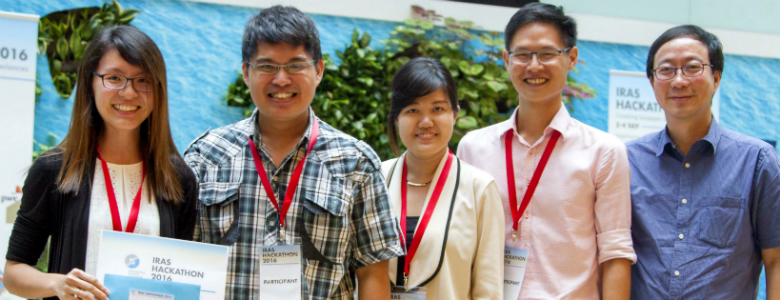Taxbook Example of a Hackathon

While hackathons have become a widely accepted way for organisations to crowdsource new apps or come up with meaningful solutions, it is also a relatively new way of fostering community collaboration — where individuals from within and outside an organisation come together to brainstorm solutions to common challenges.
This was the objective for the first tax hackathon organised by the Inland Revenue Authority of Singapore (IRAS). The three-day event ran from 2 to 4 Sep 2016, and roped in IRAS officers and the community to co-create solutions to shape tax administration in Singapore.
Mr Robin Ng, IRAS’ Director of Enterprise Digital Solutions said: “IRAS aims to provide intuitive and convenient digital services to taxpayers. Public agencies like us can better serve the community with a richer understanding of citizens’ preferences and needs.”
As an added benefit, hackathon participants would get better insights and understanding of the significant role of taxes in nation-building.
Co-creation was the order of the day.
Mr Ng said: “Many creative and innovative ideas were generated from the Hackathon, such as record-keeping and expense tracking apps, personal tax dashboards and chatbots. We believe many of these ideas are feasible and executable.”
IRAS spared no effort in helping participants to get to grips with tax matters.
As Mr Ng explained: “It is the first time that a hackathon is held around the topic of tax, with the focus of creating taxpayer-centred experiences for SMEs, the self-employed and individual taxpayers.”
Participants received tax insights and practical advice from IRAS subject matter experts as well as senior tax and industry mentors from SIATP, Deloitte, EY, KPMG and PwC.
“The tax perspectives were complemented by the mentorship from our technology and business partners for IRAS Hackathon 2016 – Microsoft and Visa.”
Prepping for the Hackathon
IRAS’ groundwork went deep into the details.
To ensure that the opportunity areas for the Hackathon were practical and relevant to the current experiences of taxpayers, IRAS conducted several rounds of focus group discussions with SMEs, tax agents, and IRAS senior management and staff.
During the Pre-Hackathon workshop on 30 Aug, industry experts provided an overview of the tax filing process for SMEs, the self-employed and individual taxpayers, IRAS’ key initiatives, as well as insights on the various challenges faced by different groups of taxpayers.
Participants took part in an interactive Q&A session with industry experts as well as IRAS senior management where they shared about opportunities and challenges in managing the different tax-filing and taxpaying experiences for the different groups.
They were also introduced to the datasets and Application Programme Interface (APIs) that were developed in-house by IRAS for the Hackathon during the Technology workshop on 31 Aug.
Mr Ng said: “We recorded a total of about 1800 requests to the API, with at least ten developers making ten calls to the API. A substantial number of the 19 teams mentioned the API in their final 3-minute presentation to the judges. “
The teams were judged based on the impact of their solutions, innovativeness, user experience and feasibility of the solutions.
Winning Returns
The winning Wondertax team, formed by alumni from Singapore Management University (SMU), developed an SME-friendly web app that transforms accounts to tax computation — in three simple steps.
It even pre-fills the tax form, generates the relevant tax adjustments, and even connects SMEs to IRAS-certified professionals if they have queries.
Wondertax member Winnie Low said in an interview: “Three of us have experience working in the tax industry. We came up with the idea because we felt it was an application that we would like to have in the course of our work, and also to help small business owners file their taxes in a more efficient manner.”
The team won $3,500 for taking the top spot.
Four IRAS staff also participated in the Hackathon and formed teams with the public to co-create solutions.
Mr Sean Koe, a Senior Tax Investigator in IRAS, said “It was the first time I had ever participated in a competition where I had to work with developers and learned from them about some of the new technologies currently available on the market”
“This allowed us to integrate ideas that we previously thought was not possible such as OCR (Optical Character Recognition) technology to extract information from photographs such as receipts.”
Following the Hackathon, IRAS will invite selected teams that are interested to further develop their solutions to apply for the IRAS Co-Creation grant of up to $30,000.
Successful applicants can use this grant to develop their ideas into a working product, and can then own and sustain the product developed.
As part of its overall transformation plans, IRAS seeks to redefine the experiences of the taxpaying community by leveraging analytics, design and digitalisation.
Director of IRAS Transformation Office, Ms Angela Ang said: “The competition has brought IRAS fresh perspectives and new insights on how we can address the challenges identified. We will also be in touch with teams whose ideas have the potential to be further developed for the benefit of the taxpaying community.”
The trend of co-creation and collaboration to deliver innovation and service excellence appears to be here to stay.
Ms Ang said: “The Hackathon also showcased the power of co-creation with the coming together of start-ups, developers, designers, tax and accounting professionals, industry experts, students and IRAS staff.”
Find out more about the winning projects at IRAS Hackathon 2016 or enjoy the highlights video of the event.
Image credit
- Photos of IRAS Hackathon courtesy of IRAS.
- Caption for top photo: Wondertax members (from left) Ms Chen Junqi, Mr Ng Thiam Hock, Ms Winnie Low and Mr Tan Liang Jun, with Commissioner of Inland Revenue & Chief Executive Officer, IRAS, Mr Tan Tee How.

